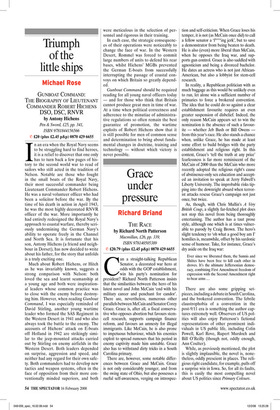Triumph of the little ships
Michael Rose
GUNBOAT COMMAND: THE BIOGRAPHY OF LIEUTENANT COMMANDER ROBERT HICHENS DSO, DSC, RNVR by Antony Hichens Pen & Sword, £25, pp. 341, ISBN 9781844156566 ✆ £20 (plus £2.45 p&p) 0870 429 6655 In an era when the Royal Navy seems to be struggling hard to find heroes, it is a relief to discover that one only has to turn back a few pages of history to the second world war to read of sailors who still acted in the tradition of Nelson. Notable are those who fought in the small boats of the Royal Navy, their most successful commander being Lieutenant Commander Robert Hichens. He was a naval volunteer officer who had been a solicitor before the war. By the time of his death in action in April 1943, he was the most highly decorated RNVR officer of the war. More importantly he had entirely redesigned the Royal Navy’s approach to coastal warfare, thereby seriously undermining the German Navy’s ability to operate freely in the Channel and North Sea. It is fortunate that his son, Antony Hichens (a friend and neighbour in Dorset), has now decided to write about his father, for the story that unfolds is a truly exciting one.
Much about Robert Hichens, or Hitch as he was invariably known, suggests a strong comparison with Nelson: both loved the sea and learnt seamanship at a young age and both were inspirational leaders whose common practice was to close with the enemy before destroying him. However, when reading Gunboat Command, I was especially reminded of David Stirling, another young wartime leader who formed the SAS Regiment in the Western Desert in 1941 and who also always took the battle to the enemy. The accounts of Hichens’ attack on E-boats off Holland in 1942 are strikingly similar to the jeep-mounted attacks carried out by Stirling on enemy airfields in the Western Desert. Both leaders depended on surprise, aggression and speed, and neither had any regard for their own safety. Both commanders had to develop new tactics and weapon systems, often in the face of opposition from their more conventionally minded superiors, and both were meticulous in the selection of personnel and rigorous in their training.
In each case, the strategic consequences of their operations were noticeably to change the face of war. In the Western Desert, Rommel was forced to commit large numbers of units to defend his rear bases, whilst Hichens’ MGBs prevented the German E-boats from successfully interrupting the passage of coastal convoys on which Britain so greatly depended.
Gunboat Command should be required reading for all young naval officers today — and for those who think that Britain cannot produce great men in time of war. At a time when political correctness and adherence to the minutiae of administrative regulations so often remain the best guarantee of promotion, the wartime exploits of Robert Hichens show that it is still possible for men of common sense and determination to bring about fundamental changes in doctrine, training and technology — without which victory is never possible.


















































































 Previous page
Previous page